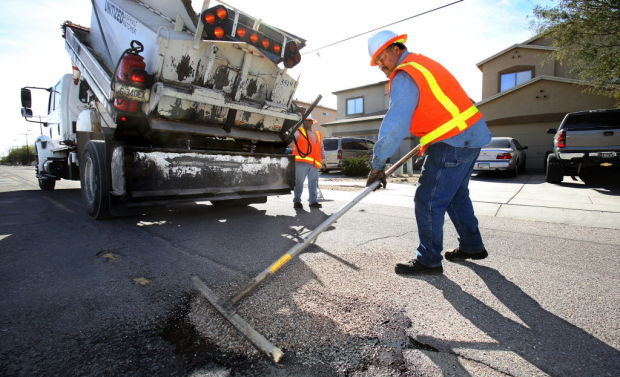Tucson voters may ultimately decide which is worse — paying for an estimated $1.2 billion in infrastructure repairs or continuing to postpone them.
The Tucson City Council will discuss a plan Wednesday, Oct. 5, that would ask voters to approve up to $100 million in general obligation bonds funded through increased secondary property taxes and a half-cent increase in the city’s sales tax.
The proposal by City Manager Michael Ortega would not address every issue or fix every street; estimates suggest the proposed tax hikes would generate $350 million over five years, to be spent on public safety equipment, streets, city parks and sidewalks.
Currently, the city has a strategy of fix-it-when-it-breaks, and spent less than $30 million in the last three years on deferred maintenance.
If the council decides to send the proposal to voters, the property tax vote would have to wait to put the item on the ballot in November 2017. State law requires property tax-related items to be approved by voters in a general election, city officials say.
Increasing the sales tax by a half-cent would cost the average taxpayer $2.98 a month, city officials estimate. There is no estimate on how much an increase in the secondary property tax would cost the average homeowner.
The council told Ortega in August to come up with plans to address at least some of the needs of Tucson’s aging and crumbling infrastructure.
Under the two-part proposal, the half-cent sales tax would generate an estimated $50 million annually and would end after five years unless voters approved an extension.
A majority of the $250 million generated by the sales tax — $150 million — would go to replacing aging equipment and repairing infrastructure for the Tucson Police and Fire departments.
The new revenue would help pay for repairs and expansion of fire stations and police training facilities as well as replace aging fire trucks, patrol cars and other vehicles, Ortega said in a memo.
Ortega’s plan for the sales tax calls for $100 million for road repairs over five years, with 65 percent going toward major roads and 35 percent going to repair neighborhood streets.
Of the other $100 million raised, $80 million would be spent on city parks and $20 million on sidewalk improvements and other connectivity-related improvements.
Councilman Steve Kozachik said he is open to the discussion, but that the city should put more money into road repair. “If we listen to people at all we know that is their Number One priority far and away,” he said.
He said he would take a hard look at the costs set aside for public safety infrastructure. “Are the things they’ve identified in there essentials or are they things that would make life easier?” he said.
One of his concerns, he said, is an estimated $38 million for fire station improvements. “We can tell people we need to spend a certain amount of money on new apparatus so that a paramedic shows up at your door at your house on time,” Kozachik said. “But I don’t think we can tell people that we need to spend a certain amount of your money so that firefighters aren’t sleeping on lumpy mattresses.”





